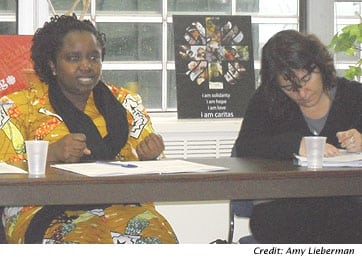
 UNITED NATIONS (WOMENSENEWS)–Margot Wallstrom, the U.N.’s special representative on sexual violence in conflict, flew to the Democratic Republic of Congo on Tuesday for a weeklong visit to a region where women suffered mass rape attacks two months ago.
UNITED NATIONS (WOMENSENEWS)–Margot Wallstrom, the U.N.’s special representative on sexual violence in conflict, flew to the Democratic Republic of Congo on Tuesday for a weeklong visit to a region where women suffered mass rape attacks two months ago.
The same day, Justine Masika Bihamba, a leading Congolese anti-rape activist, toured New York and U.N. offices with a plan for preventing rapes in her war-torn country.
The two criss-crossed in more ways than who was going to and coming from the Democratic Republic of Congo.
On the eve of Wallstrom’s visit to meet with several hundred women who were raped between the July 30 and Aug. 3 attacks, she told a press gathering "we still have a window of opportunity to apprehend perpetrators." She spoke on Monday following a U.N. Human Rights Council hearing in Geneva.
Safety activists have long said that a culture of impunity surrounds sexual violence in eastern Democratic Republic of Congo. In the hearing, Wallstrom singled out names of perpetrators from the Mai-Mai to the Democratic Forces for the Liberation of Rwanda rebel groups.
"We need high-profile cases where somebody is actually caught for doing this, where somebody is punished for doing this, and that sends a strong message," Wallstrom said at the Geneva press conference following the hearing.
But Bihamba, the visiting Congolese activist, doesn’t think focusing on apprehending perpetrators will go far enough to prevent the problem.
"Wallstrom seems very committed, but the problem is that she deals more with the consequences of rape than with the causes," said Bihamba, founder of the Synergy of Women for the Victims of Sexual Violence, a coalition of 34 women’s organizations in eastern Democratic Republic of Congo. She spoke through a French translator in an in-person New York interview.
Spotlighting Rebel Activity
What is needed, she said, is for Wallstrom to spotlight the rebel activity that is causing the mass war rapes.
Bihamba wants the United States to pressure neighboring Rwanda to find a solution to its rebel activity in the region, which she says fuels lawlessness and widespread violence.
The Congolese army, known as the FARDC, has incorporated rebel leaders into its ranks and also presents an enormous threat, Bihamba said. Government soldiers assaulted her two daughters in 2007 and attempts to prosecute them resulted in death threats for her and her family, she said. The international community needs to enhance its military coordination with the FARDC, says Bihamba.
Donatella Rostanga, a policy officer for the European Network for Central Africa, based in Brussels, Belgium, agrees. "Nations train battalions with different military perspectives and with no coordination," Rostanga said. "That makes it very hard to form any kind of coherent army."
In August, more than 500 women were gang-raped by rebel-armed soldiers in the troubled eastern part of the Democratic Republic of Congo, in the province of North Kivu, just 20 miles from a U.N. peacekeeper base.
Wallstrom dispatched a senior team member to the region Aug. 25, shortly after her office learned of the attacks. But as she and other critics have said, her office was among the last to learn of the attacks on Aug. 21.
Traveling to Affected Region
Now, one month later in her weeklong visit, Wallstrom will be traveling to the capital city of Kinshasa and then to the affected region of Walikale. She will meet with government officials, rape survivors and nongovernmental organizations.
Wallstrom said on Monday in Geneva that it was "very problematic" that her office heard about the attacks so late and acknowledged that "we are still not in the loop, fully."
Secretary-General Ban Ki-moon appointed Wallstrom in April and she formally assumed office in June. One quarter of the way through her two-year mandate, she has assembled three members of her six-person team.
Filing the remaining posts depends on members of the U.N. General Assembly approving its budget at the end of this year.
When Wallstrom arrives in New York Tuesday, she will prepare a Security Council briefing on her trip, said Letitia Anderson, advocacy and women’s rights specialist of the U.N. Action Against Sexual Violence in Conflict. Wallstrom just moved to New York from Geneva and will start basing out of her U.N. office after she returns from the trip.
Wallstrom chairs the coalition that comprises the 13 U.N. entities in the Action Against Sexual Violence in Conflict. U.N. Women is expected to serve as a member of this coalition when it envelops UNIFEM and three other existing U.N. gender agencies in January.
Would you like to Comment but not sure how? Visit our help page at https://womensenews.org/help-making-comments-womens-enews-stories.
Would you like to Send Along a Link of This Story?
https://womensenews.org/story/leadership/100929/un-seeks-congo-rapists-congolese-urges-wars-end.
Amy Lieberman is a correspondent based out of U.N. headquarters in New York.
For more information:
Stop Rape Now:
http://www.stoprapenow.org/


